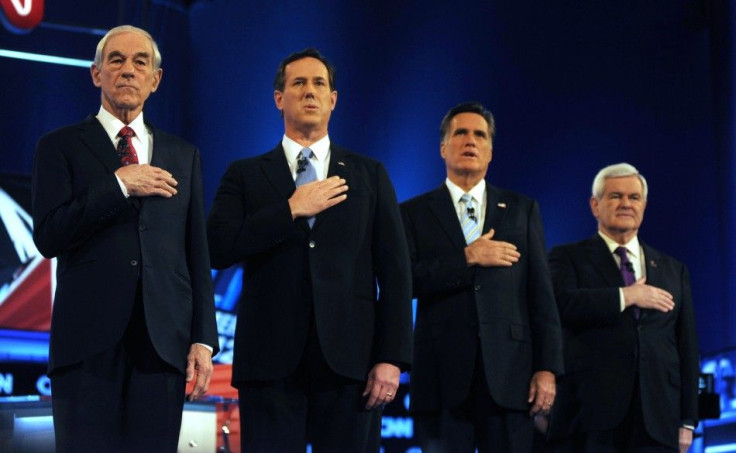Romney, Despite Low Popularity, Could Win Mississippi, Alabama Primaries: Poll

Newt Gingrich is the most popular Republican candidate among Southern voters a day ahead of the Alabama and Mississippi primaries, but personal appeal might not be enough to keep him in contention for his party's presidential nomination.
Likely Republican voters in Alabama and Mississippi are almost evenly split among Gingrich, Mitt Romney and Rick Santorum, with Rep. Ron Paul of Texas polling below 10 percent in both states, according to a new survey from Public Policy Polling released Monday.
In Mississippi, which along with Alabama conducts its primary on Tuesday, Gingrich is barely leading the pack. Just 33 percent of probable voters said they would vote for the former House of Representatives speaker if the election was today. Thirty-one percent said they would cast their ballot for Romney, 28 percent picked Santorum and 6 percent chose Paul.
As for Romney, even though more respondents said they would vote for the ex-Massachusetts governor, polling indicates Mississippians generally have a lower opinion of him than they do of Santorum, who is currently third in the state. Gingrich is apparently the golden boy in Mississippi: Asked for their opinions of the four remaining GOP presidential hopefuls, 62 percent said they regarded him favorably, followed by Santorum with 60 percent and then Romney with 51 percent.
The same polling discrepancy between favorability and voter intention can be seen in Alabama, where Romney currently leads with 31 percent in the latter category, followed by Santorum (30 percent) and Gingrich (28 percent). Despite those numbers, Gingrich and Santorum are far more popular than Romney: Sixty-three percent of respondents said they had a favorable opinion of Santorum, while Gingrich netted 58 percent. Romney, again, came in last in popularity, with only 53 percent expressing a positive opinion.
Conservatives Divided
The significant split among conservative voters in the two Southern states may account for Romney's surprisingly high chance of winning Tuesday. In Mississippi, where 44 percent of voters described themselves as very conservative, only about a quarter of that group said they support Romney. Still, the rest are narrowly split among Gingrich (35 percent) and Santorum (32 percent), allowing Romney to stay competitive despite his struggle to connect with Southerners.
Pollsters are saying there's no clear sign any single candidate has momentum in either state toward the nomination.
About all we know for sure about Tuesday's primaries is that Ron Paul will finish last in them, Dean Debnam, president of PPP, said in a statement. Beyond that, it's plausible that any of the candidates could finish between first and third in both Alabama and Mississippi.
Romney has faced such mixed reactions throughout the primary season. At one time or another, all of his rivals except Paul have surged, only to yield to what pundits claim is the inevitability of a Romney nomination. Over the weekend, Gingrich donned his history professor's hat to dismiss the idea that Romney is the GOP front-runner, even though he has won more delegates to this summer's Republican convention than his three competitors combined.
The fact is that Romney is probably the weakest Republican front-runner since Leonard Wood in 1920, and Wood ultimately lost on the 10th ballot, Gingrich said in an interview with Fox News Sunday.
Leonard Wood was a renowned U.S. Army general who led a deadlocked convention of GOP presidential contenders in 1920. The party's nomination that year ultimately went to Warren G. Harding.
During his own Fox News appearance Monday morning, Romney wasn't afraid to fire back.
If I'm a weak front-runner, then what does that make Newt Gingrich? Because I'm well ahead of him, Romney said.
Romney has won primaries in 14 states, as well as in Guam, the Northern Marianas Islands and the Virgin Islands, bringing in 454 delegates, according to the New York Times. Santorum is Romney's closest competitor with seven primary wins and 217 delegates. Gingrich, whose only wins were in South Carolina and Georgia, trails them both with 107 delegates.
A candidate needs to receive 1,144 delegates to become the Republican Party's presidential nominee.
The PPP survey also documented some of the fundamental social and political beliefs of the Deep South -- Mississippi and Alabama are two of the three most conservative states -- that are likely to influence voters' choices this year.
In both states, almost 70 percent of PPP respondents identified themselves as evangelical Christians, although only a quarter said they were Tea Party supporters.
Most respondents took the most conservative stands on a variety of partisan issues: In Alabama, 45 percent said they believe President Barack Obama is a Muslim, while in Mississippi 52 percent of likely voters reportedly shared that belief. Less than 15 percent of survey participants in either state correctly identified the president's religious faith as Christian.
In both states, more than half the respondents said they had a favorable opinion of radio host Rush Limbaugh following his controversial comments about a female law student advocating for free contraceptive access, while more than 60 percent said they don't believe in evolution.
© Copyright IBTimes 2024. All rights reserved.





















